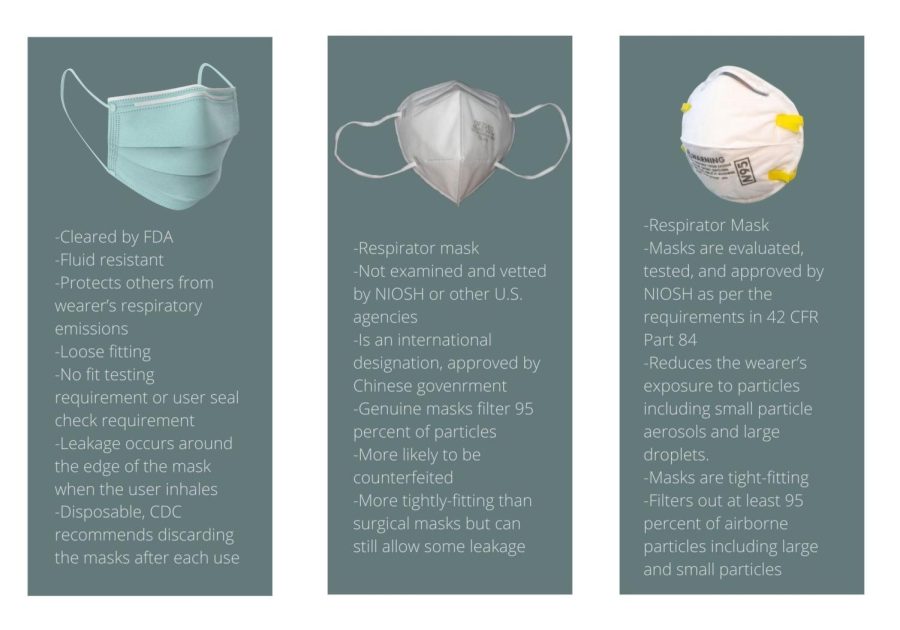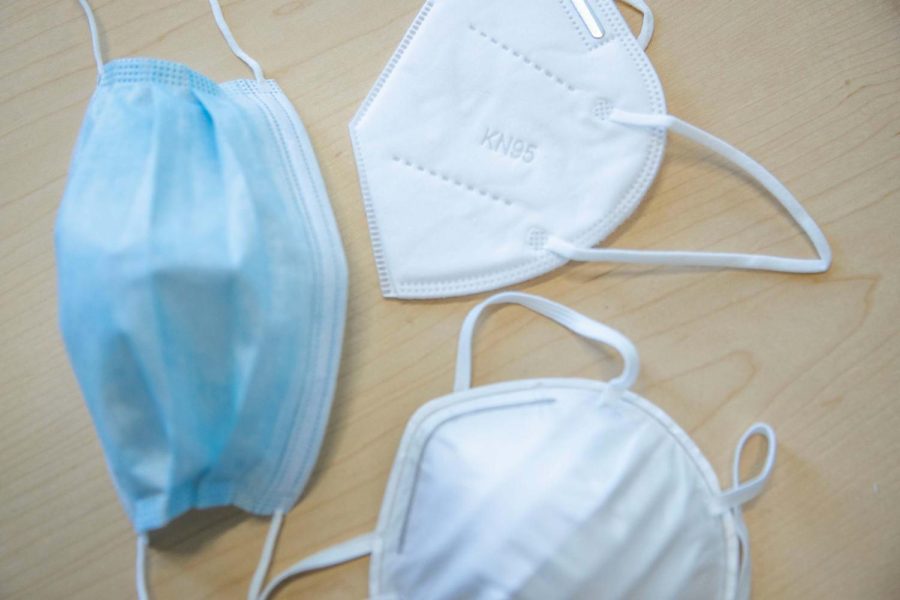N95s, KN95s best mask for protecting against COVID-19 on campus, experts say
University of Iowa health experts say that the best mask to wear to protect yourself is an N95 mask. The recently distributed KN95s provide the second-best protection, and the worst are the blue surgical masks, according to Center for Disease Control and Prevention guidance.
February 6, 2022
University of Iowa health experts recommend the UI community to wear KN95 masks instead of surgical masks to offer better protection against COVID-19.
Patrick O’Shaughnessy, director of graduate studies in the UI College of Public Health Department of Occupational and Environmental Health, said N95 masks are most effective because of the tight seal formed to the face while wearing them, while the surgical masks are least effective.
“[N95 masks are] definitely the best protection. The surgical masks they’ve been passing out give the least protection,” he said. “They were designed for source control. They’re designed to protect others from you. They’re designed to catch your output from your mouth, the droplets coming out as you talk, to prevent the transmission that way.”
When the masks are looser, like the surgical ones, O’Shaughnessy said more leakage occurs out of the mask’s sides.
O’Shaughnessy said it is better to wear a KN95 mask from the university than a surgical one, as surgical masks are not supposed to be used as the main way of combating COVID-19.
“They were never designed to be a complete protection for the person wearing them,” O’Shaughnessy said. “That’s where it’s really important for the whole campus community together to be wearing the [KN95] masks.”
The UI announced on Jan. 12 that it would stock each university building health station with KN95 masks, an upgrade from the blue surgical masks given out during the first semester.
O’Shaughnessy said he ranks the KN95 masks that the UI are giving out somewhere in the middle of the other two types of masks, as they can form a tighter seal to the mouth than the surgical masks.

“Especially with the nose metal piece there, you get a better seal around your nose with the KN95,” O’Shaughnessy said. “They filter very similarly to the N95s. It really just comes down to the construction of the mask and how well it fits against your face.”
In an email to The Daily Iowan, Jeneane Beck, assistant vice president for external relations, wrote that the UI follows the Centers for Disease Control and Prevention guidelines when evaluating masks.
Lately, counterfeit masks have been spreading throughout the country, with the CDC reporting that about 60 percent of KN95 respirators the National Institute for Occupational Safety and Health evaluated during the pandemic in 2020 and 2021 did not meet their requirements.
Deborah Zumbach, associate vice president and director of parking and transportation and business services at the UI, wrote in a statement to the DI that the university requests authenticity documentation before making purchases, including the distributed masks.
“The university is fortunate to have an experienced team making regular purchases for a large academic medical center,” Zumbach wrote. “This results in business relationships with a variety of reliable vendors and suppliers in the United States. When making any purchase, the team requests all available documentation regarding a product’s efficacy and authenticity.”
The KN95 masks that are being distributed are from the company Dayhelp. The Dayhelp website states that the masks are FDA Registered Class 1. However, the company is not listed on the CDC website as a NIOSH-approved manufacturer of N95 respirators.
According to the CDC, surgical masks are loose-fitting, disposable, and create a physical barrier between the nose and the mouth of the wearer. These masks, however, may not provide as much protection compared to a KN95 mask.
“While a surgical mask may be effective in blocking splashes and large-particle droplets, it does not filter or block very small particles in the air that may be transmitted by coughs, sneezes, or certain medical procedures,” the CDC website states. “Surgical masks also do not provide complete protection from germs and other contaminants because of the loose fit.”
Dan Diekema, professor of internal medicine and associate hospital epidemiologist, said in a recent post on the UI Hospitals and Clinics’ website that he recommends people wear a medical-grade mask, whether it is a surgical, KN95, or N95 mask.
“We also consider unfitted N95s and KN95s to be equivalent to a medical-grade mask because they fit snugly against the face, allowing for fewer particles to break through,” Diekema said. “The most important thing is the fit to the face to protect the person wearing the mask, as well as others.”



